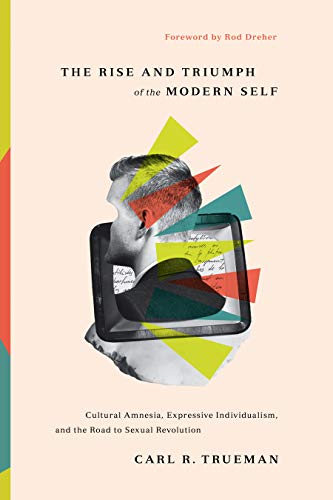A Brief Book Summary from Books At a Glance
By Steve West
Introduction
In this book Trueman examines the factors that have led us to our current cultural acceptance of LGBTQ+ concerns. He argues that the widespread acceptance of these views is based on far more than sex—there are foundations which were laid in history in order for sex and sexual identity to be perceived as they are today. Trueman traces out the genealogy of these foundational ideas, as well as providing a narrative for how they became ingrained in our cultural ethos and imagery.
Subjective feelings-based psychology has become primary for self-identity. The old foundations of metaphysical order and the realm of the sacred have been eliminated. Even our body is no longer objective for establishing identity. Radical individual expressivism combined with therapeutic concerns and societal acknowledgement are the order of the day. Revisionism is occurring in all areas of life. Trueman assesses how society ended up at this place, as well as lays the stage for the church’s response.
Table of Contents
Introduction
Part 1 Architecture of the Revolution
Chapter 1 Reimagining the Self
Chapter 2 Reimagining Our Culture
Part 2 Foundations of the Revolution
Chapter 3 The Other Genevan
Chapter 4 Unacknowledged Legislators
Chapter 5 The Emergence of Plastic People
Epilogue to Part 2
Part 3 Sexualization of the Revolution
Chapter 6 Sigmund Freud, Civilization, and Sex
Chapter 7 The New Left and the Politicization of Sex
Epilogue to Part 3
Part 4 Triumphs of the Revolution
Chapter 8 The Triumph of the Erotic
Chapter 9 The Triumph of the Therapeutic
Chapter 10 The Triumph of the T
Epilogue to Part 4
Concluding Unscientific Prologue
Summary
Introduction
A previous generation could never imagine anyone asserting, “I am a woman trapped in a man’s body.” How did our society reach a place where such statements are considered coherent and valid? Such statements require enormous metaphysical assumptions. The sexual revolution that transformed sexual values in the 1960s is vital to the current climate of sexual politics. Today, language is used to make it illegitimate to voice dissent from the politically correct sexual politics of the culture.
The idea of the self has been prioritized, and the most important way we understand our own selves is through our inner psychology, feelings, and intuitions. We are told to do whatever makes us happy and to identify ourselves with whatever we feel.
The sexual revolution was not just about sex, it was about how individuals view themselves. Social conservatives need to be careful about reducing the complex phenomena of the sexual revolution down to one cause (even “sin”). The sexual revolution took place in a context of a revolution in understanding the self, and this required a host of factors including philosophical, political, and technological ones. Although this book cannot be exhaustive, it will strive to explain the context and intellectual genealogy that now permeates and shapes the thinking of many people in our culture.
We must not simply condemn the present and bemoan the loss of the past. Before we criticize and critique, we need to understand. This book will explore why a particular notion of the self now dominates the West and why its clearest manifestation is in the transformation of sexual norms and ethics.
Chapter 1: Reimagining the Self
The sexual revolution and its manifestations in contemporary society cannot be understood without understanding the concept of the self. Sexuality is claimed to lie at the heart of authentic personhood: this is an understanding that is completely unprecedented.
Charles Taylor has provided a helpful concept about how societies think which he calls the social imaginary. This concept is about how large groups or whole societies imagine their social surroundings and about the common understandings that allow for cohesive experience. It is how people think about the world. Cultural elites may look at life through the lens of various theories, but the social imaginary is widely held and not a critical theory.
Today, people reject the idea that the world has a given structure; they believe they can carve out meaning on the individual level. Advances in technology have altered what used to be the experiences of people in history and have made it more plausible to view the world as something we shape. Rieff has argued that culture in history directs people outward and that we learn about ourselves as we learn to conform to the larger group.
Now, however, psychological categories are the dominant way in which Westerns see themselves, and Western culture is dominated by the therapeutic. People focus on themselves and try to find authenticity in their internal psychological makeup. The movement is inward rather than outward. Expressive individualism is the cherished value. When we speak against someone’s sexual practices, this is taken not as a comment about behavior but a comment about their individuality and personal identity.
Why must identity be publicly acknowledged? Why must acknowledging some identities publicly be compulsory and others forbidden? People want the outward culture to validate their inward identity, and everyone wants everyone to acknowledge them. Everything that is disliked or considered “harmful” (especially language) needs to be changed to accommodate.
[To continue reading this summary, please see below....]The remainder of this article is premium content. Become a member to continue reading.
Already have an account? Sign In
